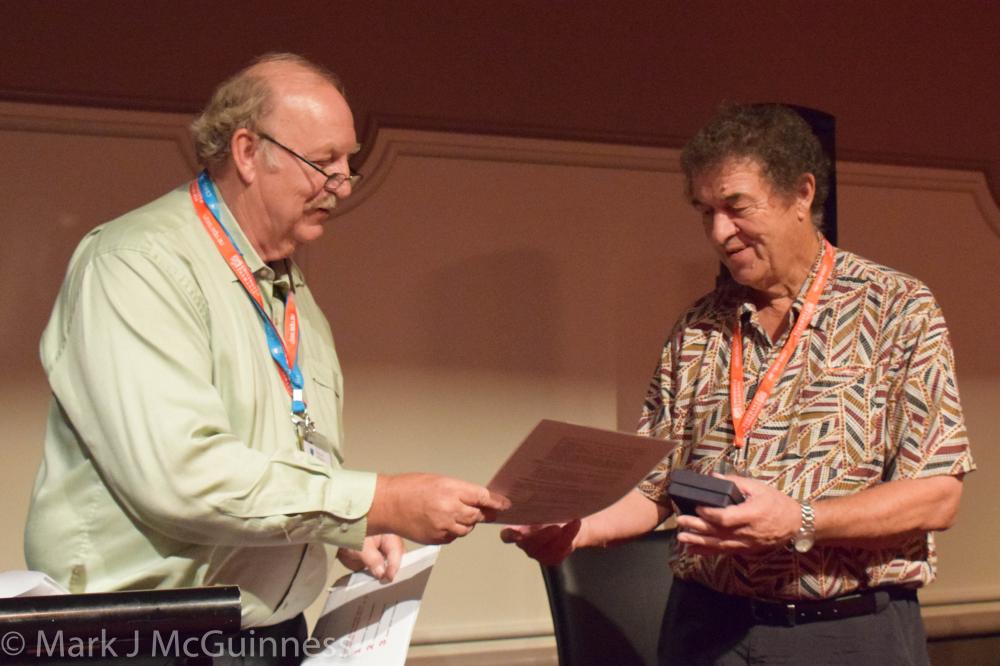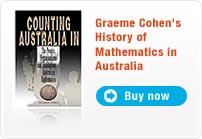The 2018 ANZIAM Medal
Professor Phil Howlett has made sustained and outstanding contributions to both the theory and applications of mathematics, particularly in the development of control theoretic methods in the transport industry. In addition, he has been an effective and passionate advocate of ANZIAM over a long period and has held a number of key positions including ANZIAM Chair, Director of the Mathematics in Industry Study Group (MISG) and chair of the ANZIAM Student Support Scheme. Also, he has trained and mentored a cadre of young capable applied mathematicians who are terrific ambassadors, both in industry and the research community, worldwide, for the kind of mathematical thinking that embodies the spirit of ANZIAM.
The ANZIAM Medal is our society’s most prestigious medal and recognises research achievement, wide-ranging activities enhancing the discipline of applied and industrial mathematics, and contributions to ANZIAM. Phil’s outstanding contributions in these three areas make him a most worthy recipient of the ANZIAM medal.

Contributions to Applied and Industrial Mathematics Research
Phil graduated with honours in Mathematics from the University of Adelaide in 1965 and then obtained a position as tutor with the South Australian Institute of Technology (SAIT, now University of South Australia). While a tutor, Phil embarked on research on approximation theory under the supervision of Jim Michael at the University of Adelaide and was awarded a PhD in 1971. In 1979 he was a Visiting Fellow at the Control Theory Centre at the University of Warwick where he worked on his initial publication on control theory. This was the first of his many contributions to this area.
In 1982 Ian Milroy formed the Transport Control Group at the SAIT and Phil developed rigorous mathematical justification for the heuristic strategies used by Metromiser, the control system for short journeys that had been developed by the group. At the same time he produced the first theoretical confirmation that speed-holding should be used if the journey time is relatively large. This work had immediate impact for future work on long-haul strategies by the group. In 1990 the Transport Control Group was renamed the Scheduling and Control Group. Phil led this Group from 1992 to 2011. Under Phil’s leadership, and by virtue of his long-standing collaboration with Peter Pudney, the achievements of this group include:
- Development of a complete mathematical theory for the calculation of optimal train-driving strategies for trains under discrete control
- Major contributions to the theory of optimal train-driving strategies under continuous control
- Development of a mathematical theory for optimal driving strategies for solar-powered racing cars
- Development of rail technology software Freightmiser and Energymiser in collaboration with rail industries
In addition to national competitive grant awards, the work by the Scheduling and Control Group has been recognised by the following awards:
- Control strategy team for Aurora 101, winner of the World Solar Challenge (1999).
- Winner, Australia Technology Award, Technology Development from the Government Sector, University of South Australia, with Siemens and ICT for Development of Metromiser Technology (2000).
- Winner, Australasian Railway Association Rail Industry Awards for Excellence; for the Freightmiser Program for TMG International (2004).
- TTG Transportation Technology - National Export Award: Environmental Solutions Category (2014).
- TTG Transportation Technology - Supplier Export Achievement Award: Australasian Railway Association (2015).
- TTG Transportation Technology - Innovation & Technology Achievement Award: Australasian Railway Association (2015).
- Australian Society for Operations Research: Ren Potts medal for outstanding contributions to OR in Australia (2015).
- Société Nationale des Chemins de fer Français (SNCF): winner "Enterprise of the Year", awarded by Directors of Energy Departments in France, for deployment of the Energymiser (Opti-conduite) train driver advice system (DAS) as a smart phone app for 2000 TGV train drivers in France. The DAS software was developed by the Scheduling and Control Group in collaboration with TTG Transportation Technology during 1994-2017 and has been deployed around the world (2017).
In addition to his work associated with control theory, Phil has also made important contributions to the following areas:
- Theoretical analysis of the fundamental equations for the inversion of matrix and operator pencils in collaboration with various colleagues including Amie Albrecht, Konstantin Avrachenkov, Jerzy Filar and Charles Pearce.
- Water storage and rainfall modelling in collaboration with various colleagues including Jonathan Borwein, Charles Pearce and Julia Piantadosi.
- Operator approximation and estimation of random signals in collaboration with Anatoli Torokhti and Charles Pearce.
Contributions to Applied and Industrial Mathematics
Phil is an outstanding supporter of mathematics in general and applied and industrial mathematics in particular. He has successfully supervised 14 PhD scholars, participated in numerous direct interactions with industry and facilitated industrial problem-solving through the University of South Australia and the Mathematics in Industry Study Group. A partial list of the leadership positions is:
- 1994-2003: Assistant Editor, Proceedings of the Australian Mathematics in Industry Study Group.
- 1998-2004: Director, Centre for Industrial and Applied Mathematics, University of South Australia.
- 2000-2002: Director, Australian Mathematics in Industry Study Group.
- 2003-2003: Deputy Director, Australian Mathematics in Industry Study Group.
Contributions to ANZIAM
Phil has been and continues to be a passionate advocate for ANZIAM and has devoted a considerable amount of energy and time in contributing to its success. His contributions include:
- 1998-99, 2006-07: Executive Committee Member, ANZIAM.
- 2007, 2010: Deputy Chair, ANZIAM.
- 2008-2009: Chair, ANZIAM.
- 2010-2018: Chair CSIRO/ANZIAM Student Support Scheme.
The ANZIAM Medal selection panel unanimously recommends that Professor Phil Howlett be awarded the ANZIAM Medal for 2018.
On behalf of ANZIAM:
Dr Frank de Hoog Professor Kerry Landman Professor Robert McKibbin


